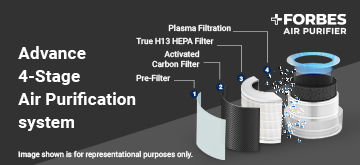
HEPA vs. Activated Carbon Air Purifiers: A Detailed Comparison
PUBLISHED ON: 05-Jul-2025
Do you often wonder why, despite regular cleaning, your home still feels stuffy or triggers allergies? The culprit could be invisible airborne pollutants. As indoor air pollution becomes a growing concern, air purifiers have become necessary to ensure you breathe clean air indoors. But when you start exploring your options, terms like HEPA filter and carbon filter pop up frequently, each promising clean, breathable air.
So, which air purifier and filtration technology should you prioritise?
This air purifier comparison aims to clear the air, literally and figuratively, by comparing HEPA vs. activated carbon filters, helping you understand their strengths and how they complement each other.
HEPA Filter
HEPA stands for High Efficiency Particulate Air. These filters are designed to trap 99.97% of airborne particles that are as small as 0.1 microns. This includes dust, mould spores, pet dander, PM 2.5 pollutants, and bacteria. A HEPA filter is especially important for people with allergies or respiratory issues. It works through a dense web of fibres that catch airborne particles as air flows through the purifier.
Advantages of HEPA Filters:
- Exceptional at capturing fine particles
- Improves indoor air quality significantly
- Reduces allergic and asthmatic triggers
Limitations:
- Cannot absorb gases or odours
- Needs to be used with another filter type (e.g., activated carbon) for comprehensive purification
Activated Carbon Filter
While HEPA filters focus on particles, activated carbon filters handle what you can’t see or smell, gases, smoke, and chemical fumes. These filters contain a form of carbon that’s been treated to be extremely porous, giving it a massive surface area to adsorb VOCs and odours.
They’re especially effective against smoke from cooking or cigarettes, pet and bathroom odours, and harmful VOCs from paints, cleaning products, and furniture.
Advantages of Carbon Filters:
- Removes unpleasant smells and harmful gases
- Makes indoor air fresher and more breathable
- Complements HEPA filters for complete protection
Limitations:
- Ineffective against dust and particles
- Requires replacement to maintain performance
HEPA vs. Activated Carbon: Which One is Better?
Here’s the answer: neither filter is complete without the other.
HEPA filters tackle the visible and microscopic particles, while carbon filters address the invisible, gaseous threats. Together, they create a comprehensive indoor air purification solution. And the best air purifiers, like those from Forbes, combine both for unmatched performance.
1. Forbes Smart 355 Surround 360° Air Purifier
Ideal for medium-sized rooms such as bedrooms or studies, the Forbes Smart 355 is designed for those who want clean air with minimal fuss.
Key Features:
- True H13 HEPA Filter: Effectively captures fine dust, allergens, and harmful particles like PM 2.5 in an air purifier, ensuring cleaner and healthier indoor air.
- Activated Carbon Filter: Adsorbs VOCs, odours, and smoke
- Plasma Filtration: Neutralises bacteria and viruses
- 360° Air Intake: Ensures faster, uniform purification
- WiFi Enabled with App Control: Operate remotely and monitor PM levels in real-time
- Auto Mode & PM 2.5 Indicator: Automatically adjusts performance based on air quality
Perfect for all homes, it blends both HEPA and carbon technologies into a portable air purifier that offers powerful protection against everyday pollutants.
2. Forbes Smart 500 Surround 360° Air Purifier
If you have a larger living room, office, or commercial space, the Forbes Smart 500 is your go-to model. It builds on the foundation of the 355 and adds even more muscle.
Key Features:
- True H13 HEPA Filter with enhanced surface area
- Activated Carbon Filter with increased capacity for VOCs
- Plasma Technology & UV LED: Offers added disinfection
- 360° Surround Air Intake: Rapid air cleaning in bigger spaces
- AI Mode & Smart Sensors: Auto-adjust based on pollutant levels
- VOC Indicator: Colour-coded indicator for volatile organic compounds
- Child Lock & Sleep Mode: Ensures safe, silent operation
This model is ideal for families, offices, or anyone looking for the best of smart air purification. It brings together HEPA and activated carbon filtration, proving that it’s not about choosing one, it’s about choosing both.
Conclusion
If you're wondering whether to buy a HEPA filter air purifier or a carbon filter air purifier, the answer is simple: get an air purifier that has both.
HEPA filters clean what you can see and what your nose can’t smell, while activated carbon filters clean what you can’t see but smell. When shopping for an air purifier, look beyond one filter. Prioritise models that offer multi-stage purification, like the ones from Forbes, which combine HEPA + activated carbon + plasma + smart tech in a compact and elegant form.
